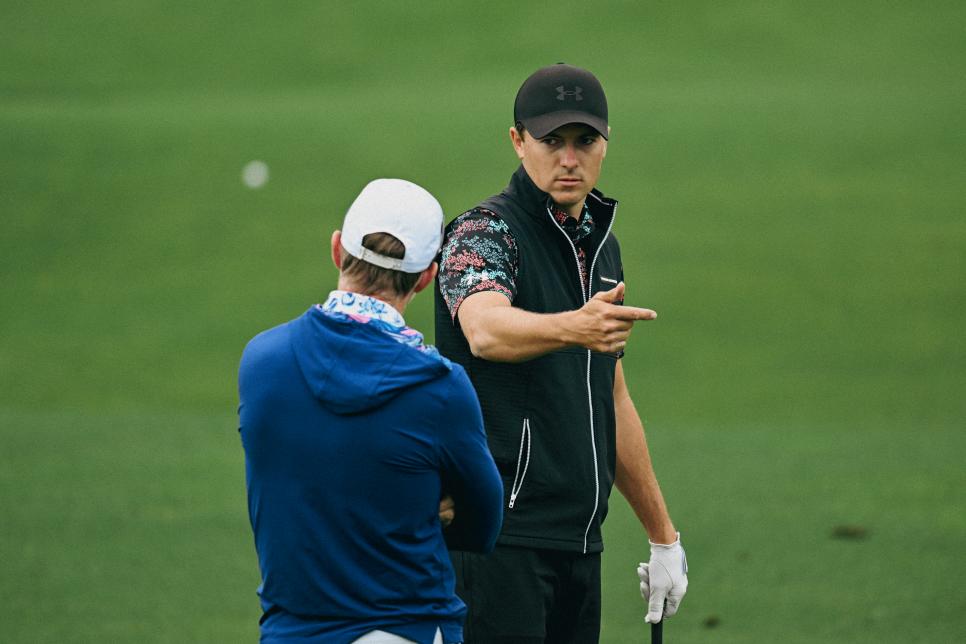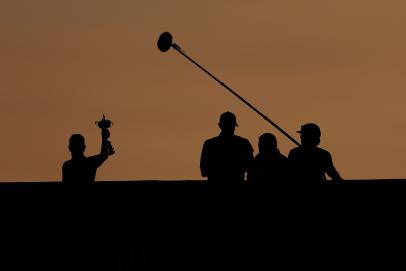AUGUSTA, Ga. — The 10 years are undiscernable to the eye. Not by disposition; Jordan Spieth bounces down the fairway with a stride of restrained giddiness, like a kid who’s been told not to run by the pool. Not by results; the swings and shots are what you’d expect of a premier golfer. Not by appearance, because babyfaces tend to conceal the scrapes of time.
But that’s how long it’s been, 10 years, since Spieth made his Masters debut. Nine since he turned in four rounds that asked questions of who this young man was and where he could go. Eight since Augusta National reminded him that for all her beauty she can likewise be sadistically cruel. And for the last seven years, Spieth and the game have waited for a day that hasn’t and may never come, even if that’s the eternal promise.
RELATED: The lost jackets of the Masters
Romanticism is rampant at the Masters, but this place and its patrons tend to develop special bonds with certain players. That’s one of the many facets that make this tournament what it is, the rapport between competitors and onlookers changing from entertainment into something more. With the greats, Jack and Tiger and Arnie, yes, but also with others, like Fred Couples and Ben Crenshaw. As of late, Spieth and Augusta National is the love story golf cannot quit.
Some of it has to do with his sentiments about Augusta. Masters fans want their stars to harbor the same type of passion for the event as they do. “It was my favorite tournament growing up,” Spieth said on Tuesday. “I fell in love with it from kind of the mid-2000s, that crazy run of Tiger and Phil and whatnot, that got me into the game. So it was the most visible tournament, and obviously the crazy shots that were hit, the history of the event and the golf course itself.”
Some of it has to do with how he plays. Most professionals play a game we are not familiar with; we know Spieth’s game, because it mirrors ours. The fits over two-footers, punching question marks into launch codes, his ball finding spots that leave cartographers scratching their heads. That he escapes many of these inexorable fates of the messes he makes is not just exciting but gives the rest of us poor pastards hope.
Some of it has to do with him. Spieth is funny, charming, thoughtful. He has been humble in victory and defeat, but he also has no poker face. Golf’s characters tend to be emotional cyborgs, but with Spieth you never have to guess what he’s feeling. He lets us in, and when he hurts—which has been often over the last decade—you hurt with him.
But most of the love story has to do with his fledgling success. He was in the final pairing in his first start at the 2014 Masters, ultimately finishing second. The following year he won in record-setting fashion. The back-nine collapse in 2016, leading to another runner-up. He played in the penultimate group in 2017 and nearly authored a final-round 62 in ‘18 that’s one of this tournament’s all-time what ifs?.
“Each year you gain a little bit of experience, you have different shots that you’re like, oh, wow, OK, that was a better way to play that hole. Or, you know, man, I haven’t been here before, I don’t want to go here again,” Spieth said of the course. “And so when you start picking your strategy for Thursday and you start seeing the hole locations, I think year over year it obviously helps quite a bit.
“Now, in 2015 I had come in, I had finished second and then lost in a playoff. So I believe I could have been playing anywhere and would have been able to win by four. I think, you know, I didn’t know as much as I do now, which is more of an advantage now than I had then, but I was obviously playing as one of the best in the world at the time.”
It was not unreasonable then to think Spieth could challenge Nicklaus’ record of six green jackets, and that this time coincided with a boom outside these gates—winning two other majors and 14 worldwide titles—spurred Spieth’s standing and popularity within the game. In a post-Tiger world Spieth appeared to be the game’s brightest star.

That was then, and now … now is different.
There’s no need to relitigate Spieth’s meteoric rise and fall and return from the wilderness. What has been mostly left unsaid, however, has been Spieth’s performance since he was declared as officially “back.” He’s been good since winning the 2021 Valero Texas Open: a runner-up at the Open Championship later that summer, winning the RBC Heritage in 2022, a couple of top-five Masters finishes and three U.S. team appearances. Conversely, Spieth has not been great, by his standards or the standards of stardom, putting him in an odd purgatory where he’s treated like one of the best with a performance that doesn’t live up to the billing. He hasn’t stalled out … but he hasn’t been moving, either.
His station in life has changed, too. Spieth remains a fan favorite, but he’s also one of the authors of the PGA Tour’s future, leading its charge in negotiations with private-equity investment and with LIV Golf’s financial backer, the Public Investment Fund of Saudi Arabia. That Spieth has voiced more power to the tour’s stars, sources tell Golf Digest, has somewhat hurt his reputation among the rank-and-file. Perhaps just as importantly the game has changed, with creativity taking a backseat to blunt-force power. Other players have emerged as marquee attractions, and though Spieth’s star remains bright, its been dimmed by their appearance and clouded by his own scar tissue. The years have brought an impalapable weight the younger Spieth had no idea he had to shoulder.
And yet, Spieth or his future can’t be dismissed for the simple fact that once a year, golf’s most celebrated tournament visits a property that Spieth has made his personal playground. Where creativity and game management still matter, where driving accuracy does, where patience and gusto are prerequisites. That allows his ridiculous game of zigzagging across the course and hitting approaches off roofs and seeing shots no one else sees work because at Augusta National the ridiculous is routine. Where youth is sidelined for experience and artists are given a blank canvas.
“Since I’ve been here, it just seems to grow on me more and more,” Spieth said. “It’s a special week from tonight through the Par 3 [Contest], now having two kids and having them involved in that, and then the tournament itself. It’s just a unique week, and I love it. I love contending here more than I do just about anywhere else, and I look forward to trying to do so this year.”
Even by Spieth standards it’s been an odd year. He’s no longer the fledgling talent, and look no further than Wednesday’s Par 3 Contest, the stage where Spieth was once gallivanting with fellow kids Justin Thomas and Rickie Fowler, and now will be with his own children. Yet those are the barometer of the present. Here, he will command some of the biggest crowds outside of Woods. Here, the unexpected is part of the plan. Here, Jordan Spieth can forget who he’s been and become the player he once was and still could be, because love stories and Augusta National are not measured in time.
MORE FROM GOLF DIGEST @ THE MASTERS
Masters 101: Answering all your frequently asked question
How to watch the 2024 Masters
Power Rankings: Every player in the Masters field, ranked
50 defining Masters Moments, ranked
The bogey golfer’s guide to surviving Augusta National
5 shots that players should NEVER hit at Augusta National
15 people who ended up in the Masters penalty box
The most memorable Rules issues in Masters history
In search of the greatest Augusta National
The Masters’ other jackets: Why working tournament week has its perks
The greatest Masters round time has forgotten
The Champions Dinner Tell-All, from those inside the room Tee times for Round 1 and Round 2
More From Golf Digest  Interactive A Comprehensive History Of Every Change Made To Augusta National Golf Club
Interactive A Comprehensive History Of Every Change Made To Augusta National Golf Club  Full Swing Thoughts ‘Full Swing 2’: The good, the bad and the provocative
Full Swing Thoughts ‘Full Swing 2’: The good, the bad and the provocative
This article was originally published on golfdigest.com

